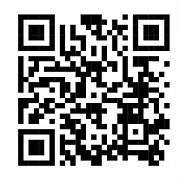Research / Survey Opportunities
Agencies, Organizations, Universities and others are often looking for participation of families and professionals for current research and survey projects. Each opportunity listed below has contact information if you would like to participate. Please contact the specific entity that is sponsoring each research/survey opportunity if you would like more information.
Unless otherwise noted, Hands & Voices does not necessarily promote the goals and objectives of listed research/survey opportunities and participants are advised to clarify any questions/concerns prior to participation with contacts listed for each research/survey opportunity.
For information on submitting your project for inclusion on this page please read our Submittal Request Sheet.
Parent Research / Survey Opportunities
- Descriptions of Studies -
Perceptions of AP Teachers Towards Accommodating Students with Hearing Loss in New Jersey High Schools
Dear New Jersey Educators and Families,
Hi! My name is Jai Malik, and I am a student in the Advanced Placement (AP) Research program at Hoboken High School in New Jersey. I am currently seeking New Jersey AP teachers to participate in my study exploring their perspectives about accommodating students with hearing loss and the factors shaping those perceptions.
Despite the well-documented postsecondary benefits of AP participation, students with hearing loss, along with other disabilities, are underrepresented in these courses at a rate of 86.9% (NCES, 2020). This study aims to address a gap in literature by identifying the collective preparation, challenges, and needs of AP teachers when accommodating students with hearing loss. It is hoped that findings can help NJ high schools and other institutions better support AP teachers in fostering inclusive educational environments for students with hearing loss.
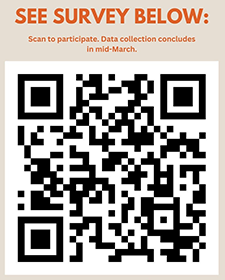 Who can participate:
Who can participate:
Any current New Jersey high school teacher of at least one AP course is eligible. Prior experience teaching students with hearing loss is NOT required. If you know a New Jersey high school or AP teacher who may be willing to participate, please share this with them.
What to expect:
Participants will complete a brief, 10-15 minute online survey via Google Forms, with an optional interview component for those wishing to share more. See link below.
Participant Confidentiality:
All responses are anonymous and confidential. No individual teachers or schools are being evaluated specifically, nor will they be identified in any publications.
Survey Link: https://forms.gle/A1FiqhebhkgrVNv79
PI Contact & IRB:
If you have any questions or would like more information about this study, please contact the Principal Investigator at jaimalik347@gmail.com. This study was approved by an Institutional Review Board (IRB) through Hoboken High School. They can be contacted at (865) 354-3000, ext. 4822.

Health Equity & ASL Communicators
The Project:
We will engage in research to understand—with the aim of addressing—health disparities among individuals who communicate using American Sign Language (ASL). To explore health equity for this population, we will use a science- and justice-based model for understanding multiple spheres of influence on health outcomes, the Health Equity Framework (Peterson et al., 2021).
We will include three groups of participants:
a) ASL communicators (18+ years old)
- Seeking individuals who communicate primarily in ASL (they can also use a spoken language or some combination of signing and speaking)
- Deaf, hard of hearing, DeafBlind, DeafDisabled – please join!
- Individuals with intellectual or developmental disabilities are welcome!
- People from any background will be included. Black, Indigenous, and Persons of Color (BIPOC) are particularly encouraged to join.
b) Parents/family members of a child who uses American Sign Language (ASL)
- Can include caregivers, grandparents, foster parents, etc. We are open to your interpretation of “family members” and aim to be inclusive
- Child communicates primarily in ASL; they can also communicate using a spoken language or some combination of signing and speaking
c) Health care and allied health professionals who support ASL communicators
- Your insights are valuable as we consider barriers and facilitators of health equity and health disparities among ASL communicators
- If you work in the health sector – please join us! Audiologists, speech-language pathologists, social workers, nurses, occupational therapists, physical therapists, physician assistants, physicians – we need your input!
Participant Requirements:
- Ability to participate via Zoom
- Can communicate via spoken English or ASL
- Has access to a computer with internet access
- Willing to engage in a focus group with 4-5 others
- Answering questions about health access and healthcare experiences
- Maintaining respect for diverse opinions
Compensation:
Participants will participate in focus groups lasting approximately 1.5 hours. Each participant will receive a $50 Mastercard gift card.

Project Funding & Details:
This project is being funded by a grant from the WITH Foundation & Robert Wood Johnson Foundation. The grant was provided to the Institute for Community Inclusion, University of Massachusetts Boston. Approved by the UMass Boston Institutional Review Board (IRB) #: 4104
For questions or to sign up to participate:
Email: Amy.Szarkowski@umb.edu
Study on Daily Listening Challenges in Older Children and Adolescents
What is the purpose of this study?
The purpose of the study is to understand what makes daily listening challenging for older children and adolescents who are deaf/hard of hearing (DHH). Recent research has shown that the ability to pay attention, remember things, and stay organized (i.e., executive function) could be associated with daily listening difficulty. We are interested in understanding if executive function abilities in older children and adolescents who are DHH are linked with daily listening challenges.
What does participation look like?
- The parent/caregiver will complete four online surveys about their child’s daily listening difficulties and associated symptoms, about how they manage their thoughts, actions, and emotions, and about their hearing, health, and educational history.
- Children will complete a 15-20 min Zoom call with our research team where they will be asked to complete two questionnaires about their daily listening difficulties and associated symptoms and answer a handful of questions about their daily listening practices.
- You and your child can earn up to $30 for participating - $15 for completing the child interview and $15 for your completion of the caregiver questionnaires.
- A full consent form can be downloaded here.
Who can sign up for this study?
- This is a virtual study, so families can participate from anywhere in the United States
- Children must be 10-17 years old
- DHH participants must have a known permanent hearing loss and primarily use listening and spoken language to communicate
- Children with typical hearing are welcome as well
- Children and their caregiver must be able to speak/understand and read (for caregiver) English
How do we sign up or learn more?
- Fill out our research interest form at https://redcap.link/iucareslab and we will contact you
- If you have questions about participating, please contact Dr. Samantha Gustafson and her team at careslab@iu.edu
Paid Study – Test a New Learning App for Parents of DHH Children!
Join Our Research Study to Test a New Parent Learning App
Researchers at Teachers College, Columbia University and the Foundation for Hearing Research invite you to participate in a research study called Talk2MeTM – Effects of a Coach-Assisted Learning App for Parents of DHH Children. You may qualify to take part in this research study if you are the parent or legal guardian of a child who:
- is under the age of 36 months
- has been identified as deaf or hard of hearing (i.e., have mild to profound permanent hearing loss in at least one ear) and
- has been fit with hearing technology (i.e., hearing aid, bone-conduction hearing aid, and/or cochlear implant).
If you choose to participate, you will complete online surveys and have access to a new parent-learning app for 12 weeks. You can also choose to participate in a virtual focus group to share additional feedback.
Participants will be compensated for their time and effort.
To participate or learn more, complete our brief interest form here: (https://tccolumbia.qualtrics.com/jfe/form/SV_9WF5rjNLJL0Cl26).
You can also contact Elaine Smolen, at es3519@tc.columbia.edu or 212-678-8407 (voice/text)
The Impact of Auditory Access on the Development of Speech Perception

The Speech Perception Over Time (SPOT) lab at the University of Colorado Anschutz Medical Campus is conducting an infant developmental study.
The goal of our research is to improve services for children who are at risk for language learning (i.e., hearing loss, reading difficulties). We do this by measuring how infants tell the difference between speech sounds. A child’s ability to differentiate between speech sounds predicts their later language abilities. So being able to measure these abilities early in life may, over time, help improve later language outcomes.
Language learning can help build relationships, impact educational success, and personal empowerment.

Who can participate:
- Infants between 1 and 12 months of age
- Infants diagnosed with permanent bilateral hearing loss and use hearing aids
- English as the primary language spoken at home
What to expect:
- One to five in-person visits between 3 and 12 months of age on the CU Anschutz Medical Campus, a nearby Children’s Hospital Colorado Audiology Clinic, or the Colorado School for the Deaf and Blind.
- Visits are 2-3 hours in length and about 1 hour is completed with your baby sleeping or resting quietly.
- Time: The study will occur at 1-5 timepoints between 3 and 12 months of age
*additional visits may be asked - Compensation is provided up to $450
- Parking and some transportation may also be compensated
- To hear about the research experience from a previous participant go to: https://www.youtube.com/watch?v=SByMA3vEzdM
Contact us:
If you are interested in participating or for more information, you can email SPOT@ucdenver.edu or call us at 303-724-9262.
If you would like us to contact you, please fill out this interest form: https://redcap.link/SPOT_InterestForm
Principal Investigator: Kristin Uhler, PhD. COMIRB #22-2374.
Project INCLUDE
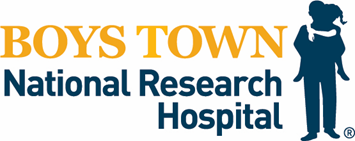
Advancing Hearing Healthcare and Outcomes for Individuals with Down Syndrome Across the Lifespan
Our primary location is in Omaha, Nebraska, with potential opportunity for travel funding for qualifying participants. We also have a research vehicle (see picture below) available to coordinate with partner sites across the United States.
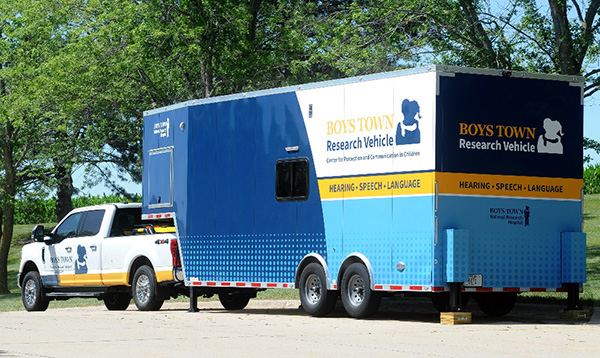
Up to 80% of individuals with Down syndrome have hearing loss at some point during their life, including fluctuating, temporary and permanent hearing loss. This hearing loss is significant because prior research has shown that the development of hearing and speech perception requires years of quality experience with sound, extensive language knowledge and maturation of executive function. One goal of this project is to characterize auditory development for individuals with Down syndrome. Another goal is to improve assessment tools for evaluating hearing and speech perception in individuals with Down syndrome across the lifespan. The results of this study have important clinical implications.
Boys Town National Research Hospital® is seeking participants ages 7 months to 65 years for a new study to advance hearing healthcare and outcomes for individuals with Down syndrome.
Participants hear sounds that are presented through a speaker or headphones. Sometimes there are background sounds, such as noise or people talking. We often use a game format to make sure the listening activities are interesting. Sounds are played at a comfortable level.
Individuals will receive a hearing test and language test for participation in this study. Compensation for this study is $20 per hour.
If you would like to learn more about this study, please contact Jenna Paulsen by email or phone (531) 355-6674. For information in Spanish, please email HADL@boystown.org or phone (531) 355-6350. Web site Link.
Para obtener información en español, envíe un correo electrónico a HADL@boystown.org o llame al (531) 355-6350.
This study is funded by the National Institutes of Health – National Institute on Deafness and Other Communication Disorders (NIHNIDCD). Grant #s R21 DC02002 and R01 DC020229.
Gene Therapy Trial for Otoferlin Gene-mediated Hearing Loss
A Phase 1/2 Trial of AAVAnc80-hOTOF Gene Therapy in Individuals with Sensorineural Hearing Loss Due to Biallelic Otoferlin Gene Mutations
Does your child have sensorineural hearing loss?
Learn more about a clinical research study for children with hearing loss caused by specific genetic changes, or mutations, called otoferlin gene (OTOF) mutations.
What is the AK-OTOF-101 study?
The goal of the study is to find out if the study drug, administered using the study device, is safe and improves hearing in children with sensorineural hearing loss (SNHL) due to otoferlin gene mutations.
About genes and hearing loss
- Our genes provide instructions to our cells to make proteins that help us live and grow. The otoferlin gene provides instructions for the body to make otoferlin, a protein necessary for hearing.
- When there are changes, or mutations, in the otoferlin gene, the body may not be able to make functional otoferlin protein.
- Without functional otoferlin protein, sounds cannot be communicated from the ear to the brain, resulting in hearing loss.
- Children with otoferlin gene mutations typically have a type of SNHL called auditory neuropathy. Auditory neuropathy is a type of SNHL where the inner ear detects sound but cannot send the sound signal to the brain.
What are the study drug and study device?
The study drug (AAVAnc80-hOTOF, or AK-OTOF) is a gene therapy. This gene therapy is designed to deliver a working copy of the otoferlin gene to cells in the ear. With a working copy of the gene in the cells of the cochlea, the organ of hearing, the body may be able to make functional otoferlin protein and may improve hearing.
The study drug will be administered to the inner ear during a surgical procedure using the study device.
Both the study drug and the study device are investigational, which means they can only be used in research trials. They have not been approved by regulatory authorities like the US Food and Drug Administration (FDA) or European Medicines Agency (EMA). This is the first time the study drug and the device are being used in humans.
What will happen during the study?
- Screening period
During the Screening period, your child will receive assessments to confirm they qualify to join the study. - Study drug administration
If qualified, your child will have surgery to receive one dose of the study drug (using the study device) in one ear. Your child will stay overnight at the site after surgery so the study staff can monitor their health. - Follow-up visits
You and your child will attend 11 follow-up visits at the site over the course of 2 years. You and your child will also be expected to participate in a Long Term Follow-up Study (with annual visits) for an additional 3 years. - You may be eligible for travel reimbursement.
Who can join the study?
To join the study, your child must meet the following requirements*:
- Between age 7 to 17 years old (inclusive, Group 1a); between age 2 to 17 years old (inclusive, Groups 1b and 2) with sensorineural hearing loss
- Otoferlin gene mutations confirmed by genetic testing (genetic testing will be provided, as needed)
- Does not have cochlear implants in both ears
*Other study requirements will apply.
What is a clinical research study?
Clinical research studies help scientists and doctors explore whether a medical strategy, drug, or device is safe and effective for people. Before a new study drug or study device can be approved and made available to the public, it must go through phases of clinical research. Each phase helps researchers learn more and relies on volunteer participants.
For more information about the AK-OTOF-101 study, or to reach out to a clinical trial site conducting the study, visit www.otofclinicaltrial.com.
This information was provided in December 2023. For the most recent updates, please refer to clinicaltrials.gov.
The DIVERSE Collective: Combatting Ableism and Other Oppression for the Health and Well-being of Children with Disabilities
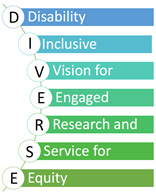
A research study being conducted at the University of Pittsburgh would like to talk with people who have knowledge about how to improve the health and well-being of the children and youth with disabilities who are most likely to be treated differently due to their race or income or for other reasons.
We know that people with disabilities are sometimes treated differently by the services and supports available, which can lead to poor health. Children with disabilities who might also experience unfair treatment or discrimination related to their race or income or other factors are especially at risk for poor health. Because not much is known about how to fix this, parents or caregivers of children with disabilities (age 0-26 years) and young adults with disabilities (age 18-26 years) are invited to participate in virtual conversations about how to make things better. Our goal is to identify solutions for the unique problems faced by children and youth with disabilities who might also experience unfair treatment related to their race or income or other factors.
If you are willing to share your expertise, we would very much like to speak with you. We will usually use a Zoom video call and speak to people in small groups, but we are ready to offer accommodations or an alternative method if Zoom does not work for you. Following the group conversation, you will receive a $100 gift card with our thanks for helping us do this research. Please let us know that you are interested by filling out this brief form (https://pitt.co1.qualtrics.com/jfe/form/SV_b9JmeGls70MZJjg). If you are unable to do so, reach out to the study team via Kristyn Felman at kristynfelman@pitt.edu or call (412) 692-6410.

Listening & Literacy Among Children With Cochlear Implants
This study is done completely online.
Anyone who meets participant criteria and is interested can participate.

This study examines auditory perception factors that might impact literacy development in children with cochlear implants. There have been auditory perception factors implicated in reading abilities in hearing kids, but not much done in looking at these factors in kids with hearing loss, particularly those with CIs. Families who participate will be compensated.
Participants should meet the following criteria:
- Children age 7-12
- Child’s hearing loss (severe-profound) was detected at or near birth
- Child received at least one cochlear implant prior to the age of 3
- Child relies on spoken English for communication
- Child exhibits no other disabilities
For an overview go here: https://prezi.com/view/w1N9DI5BPOSfKoH6jyzc/
Those interested in learning more or participating in this study should contact Dr. James Mahshie at (301)-785-4428 or jmahshie@gwu.edu.
Registration can also be done at https://www.gwu-implant.org/
 Home
Home